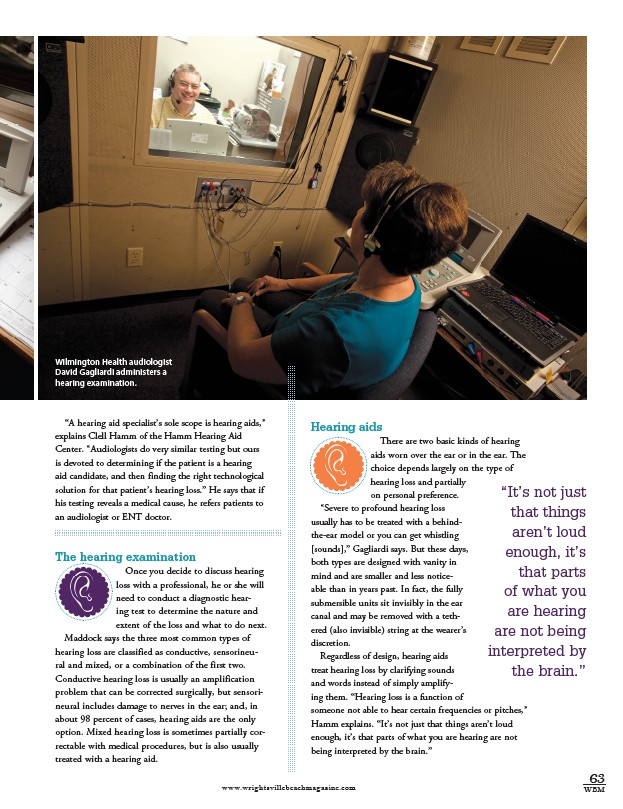
63
“A hearing aid specialist’s sole scope is hearing aids,”
explains Clell Hamm of the Hamm Hearing Aid
Center. “Audiologists do very similar testing but ours
is devoted to determining if the patient is a hearing
aid candidate, and then finding the right technological
solution for that patient’s hearing loss.” He says that if
his testing reveals a medical cause, he refers patients to
an audiologist or ENT doctor.
www.wrightsvillebeachmagazine.com WBM
The hearing examination
Once you decide to discuss hearing
loss with a professional, he or she will
need to conduct a diagnostic hearing
test to determine the nature and
extent of the loss and what to do next.
Maddock says the three most common types of
hearing loss are classified as conductive, sensorineural
and mixed, or a combination of the first two.
Conductive hearing loss is usually an amplification
problem that can be corrected surgically, but sensorineural
includes damage to nerves in the ear; and, in
about 98 percent of cases, hearing aids are the only
option. Mixed hearing loss is sometimes partially correctable
with medical procedures, but is also usually
treated with a hearing aid.
Hearing aids
There are two basic kinds of hearing
aids worn over the ear or in the ear. The
choice depends largely on the type of
hearing loss and partially
on personal preference.
“Severe to profound hearing loss
usually has to be treated with a behindthe
ear model or you can get whistling
sounds,” Gagliardi says. But these days,
both types are designed with vanity in
mind and are smaller and less noticeable
than in years past. In fact, the fully
submersible units sit invisibly in the ear
canal and may be removed with a tethered
(also invisible) string at the wearer’s
discretion.
Regardless of design, hearing aids
treat hearing loss by clarifying sounds
and words instead of simply amplifying
them. “Hearing loss is a function of
someone not able to hear certain frequencies or pitches,”
Hamm explains. “It’s not just that things aren’t loud
enough, it’s that parts of what you are hearing are not
being interpreted by the brain.”
Wilmington Health audiologist
David Gagliardi administers a
hearing examination.
“It’s not just
that things
aren’t loud
enough, it’s
that parts
of what you
are hearing
are not being
interpreted by
the brain.”